Olympic champ Saravi reclaims world title in stacked 97kg division
Sunday, September 21, 2025 - 00:52 By Ken Marantz
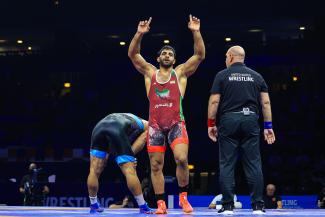
ZAGREB, Croatia (September 19) -- Mohammadhadi SARAVI (IRI) ended a four-year wait to regain the title of world champion. He had his share of triumphs in the meantime -- a gold at the Paris Olympics, to say the least -- just not on this stage.
Saravi ended the drought by scoring an early takedown and going on to defeat Artur SARGSIAN (UWW) 3-1 in the 97kg final at the World Championships in
Zagreb on Saturday night, when three Greco titles were decided.
"In my opinion, this tournament wasn’t easy at all; it was one of the most exciting and diverse competitions I’ve ever been part of," Saravi said. "There were new opponents, and some wrestlers reached the finals and repechage rounds that I honestly hadn’t expected. The level was much higher than I thought it would be."
In other finals, Aidos SULTANGALI (KAZ) gave Kazakhstan its first Greco world champion since 1999 with a quick victory at 60kg, while Ulvu GANIZADE (AZE) defeated Ibrahim GHANEM (FRA) in a headache-inducing clash at 72kg that was a repeat of the 2024 world final.
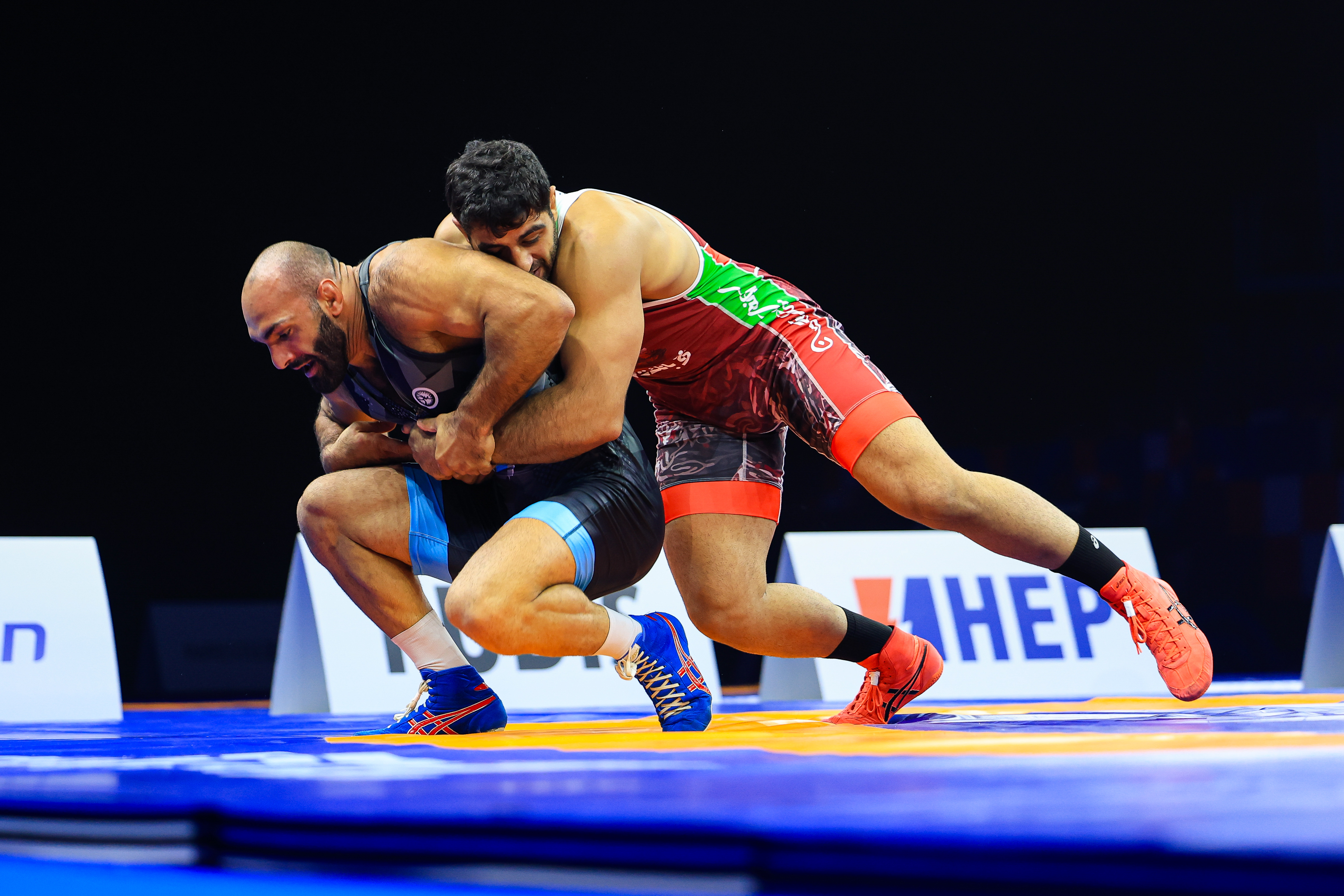 Mohammadhadi SARAVI (IRI) scores a takedown on Artur SARGASIAN (UWW) in the 97kg final. (Photo: United World Wrestling / Kadir Caliskan)
Mohammadhadi SARAVI (IRI) scores a takedown on Artur SARGASIAN (UWW) in the 97kg final. (Photo: United World Wrestling / Kadir Caliskan)
After winning the world gold in Oslo in 2021, Saravi had to settle for bronze medals at the 2022 and 2023 worlds in Belgrade, falling in the semifinals both times.
But he righted the ship for the Paris Olympics, where he defeated long-time rival Artur ALEKSANYAN (ARM) in the final to add the gold to the Olympic bronze he won at Tokyo in 2021. And from 2023 to this year, he three-peated as Asian champion.
In Zagreb, while Aleksanyan and Gabriel ROSILLO (CUB), who defeated Saravi in the 2023 world semifinals, fell by the wayside, Saravi marched into the final without pomp or drama, winning his matches by such scores as 4-0, 1-1 and 3-1.
"In this weight class, the champions are among the greats of wrestling: Artur Aleksanyan, the Cuban Rosillo, and of course, my final opponent, Artur Sargsian, who is a very well-known and skillful wrestler," Saravi said. "But with my preparation, I was able to execute my plans and win."
His meeting with Sargsian in the final was a rematch of their first-round match at the 2021 World Championships, which Saravi won 6-4 en route to his first world gold. Sargsian took a bronze.
On Saturday, the 27-year-old Saravi drew early blood when he used an arm drag to get behind and force Sargsian down at the edge for a 2-0 lead. He made it 3-0 with a passivity point, but was unable to turn Sargsian from par terre.
That left the door open for Sargsian, the winner of the Zagreb Ranking Series event in the same arena in February, when he was put in par terre in the second period. But he also could not budge the Iranian, who then ran out the clock for the win.
"As we had planned with my coaches, even though some of my expected rivals didn’t make it to the later rounds, with the analysis we had done we were able to plan well and make it to the final," Saravi said.
"I had wrestled [Sargsian] twice before, and with the strategies we had, I managed to beat him. Thankfully, this time, too, I was able to execute my plans perfectly on
the mat and win the match."
Saravi reflected on coming up short at the two previous World Championships.
"I think in the two World Championships where I won bronze, I had some technical weaknesses," Saravi said. "I was able to fix those before the Olympics and
keep that level through this year’s worlds.
"I hope I can keep improving for the upcoming tournaments and continue winning big medals."
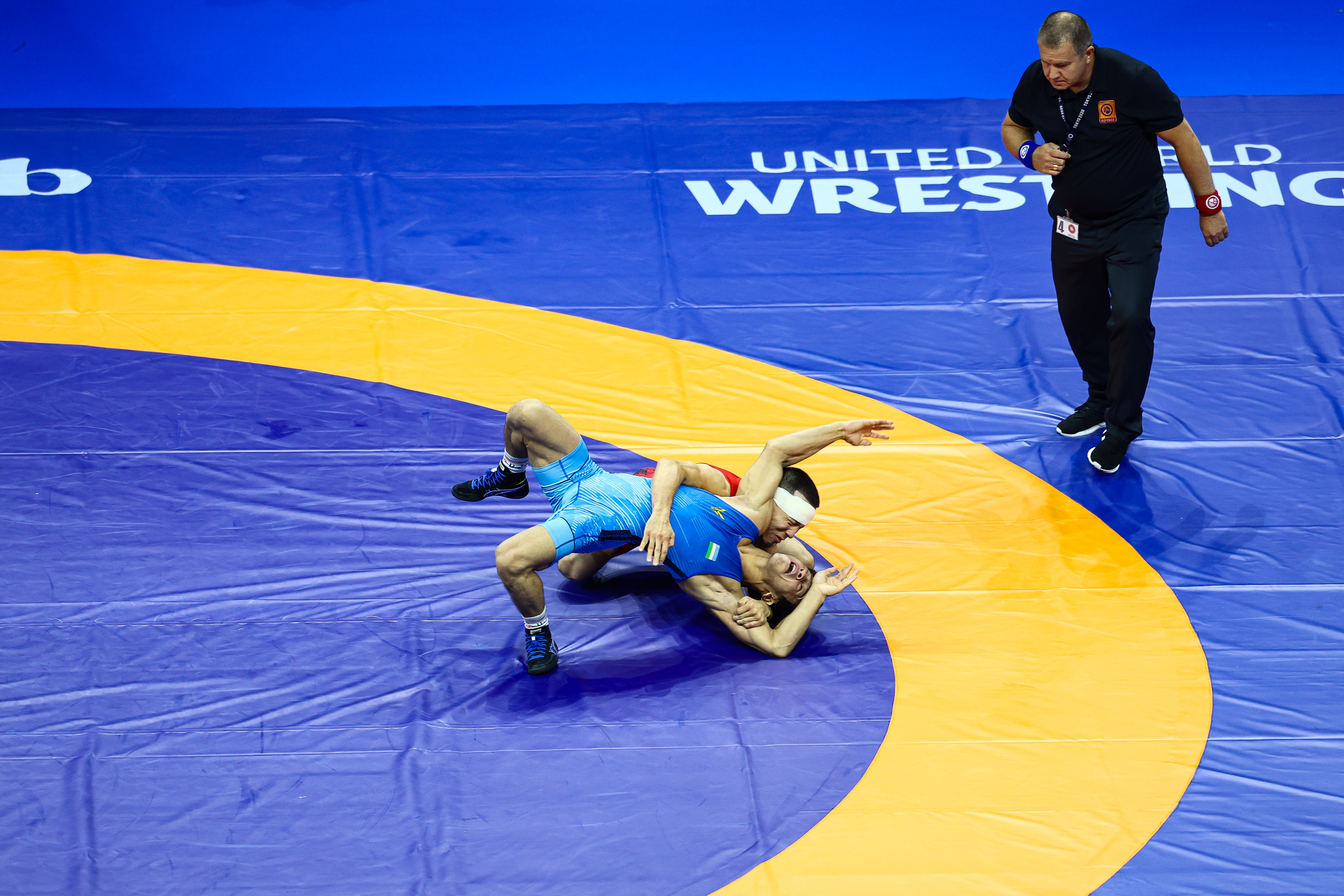
At 60kg, Sultangali, who won two world bronze medals over the five-year span between 2018 and 2022, snared his first gold with a masterful 9-0 win over Asian silver medalist Alisher GANIEV (UZB).
"Today is a historic day for our country because the last gold medal for Kazakhstan came in 1999, 26 years ago," said Sultangali, who also beat the reigning Asian
champion, Se Ung RI (PRK), in the quarterfinals. "I am happy that my country is happy."
Sultangali started the rout in the final by spinning behind for a takedown against Ganiev, then adding a roll for a 4-0 lead.
He used an arm drag to great effect to score two more takedowns to finish off the victory in 1:07. The Uzbekistan challenged the final move, but it failed, making the
final score 9-0.
"I didn’t plan to win the final match so easily and quickly," Sultangali said. "But it happened."
It was a much more fortuitous outcome for Sultangali than in their previous meeting at the Budapest Ranking Series event in July. Ganiev was leading that match 5-1 when Sultangali hit an arm throw, then continued to spin while clamping on the arm. That caused an injury to Ganiev's shoulder and got Sultangali automatically disqualified.
The 72kg final evolved into a messy affair when Ganizade was head-butted by Ghanem in the second period, a painful clash that not only drew blood, but induced a 2-point penalty that would be instrumental in the Ganizade's 4-2 victory.
The Egyptian-born Ghanem received the first passivity point in the first period, but could not score. In the second period, Ganizade was put on top in par terre, but he missed on an attempted throw, then was low on a second attempt at the edge.
The Azerbaijan side challenged the call on the second throw, but it was deemed "not a total lift," giving Ghanem a point for a 2-1 lead.
Had Ghanem just rode out the rest of the match, the gold would have been his. Instead, with :42 left, he rammed Ganizade's head, sending Ganizade sprawling to the mat in pain with blood spurting from the cut. The 2-point penalty gave him a 3-2 lead.
As if to add insult to injury, at the restart Ghanem flopped backwards, allegedly from a head to the chin from Ganizade. He challenged, but the match chairman was having none of his shenanigans, saying there was no contact and nixing the challenge to put Ganizade up 4-2.
"The competition was very tough," said Ganizade, a four-time European medalist. "Even though it was difficult, we had prepared a lot for this event and had attended many training camps. Because of the effort I put in, I believed I could become the champion at this competition -- and that is how I became champion."
It was Ganizade's third straight win in four career meetings with Ghanem, who won the world title in 2023. Previous to last year's 3-2 win in the world final, Ganizade pulled out a close 7-7 victory in the final at the 2023 European Championships.
In their first meeting, Ghanem came out on top, winning 2-1 in the first round of the Individual World Cup in 2020, a tournament set up during the pandemic.
"I have now become world champion for the second time," Ganizade said. "I also hope that after this, I will become world champion a third time and make our nation and people proud. For that reason, I will do my best."
As for what lies ahead, he said, "I’m not thinking about anything else yet. I plan to go rest first. After resting, I’ll decide what comes next."
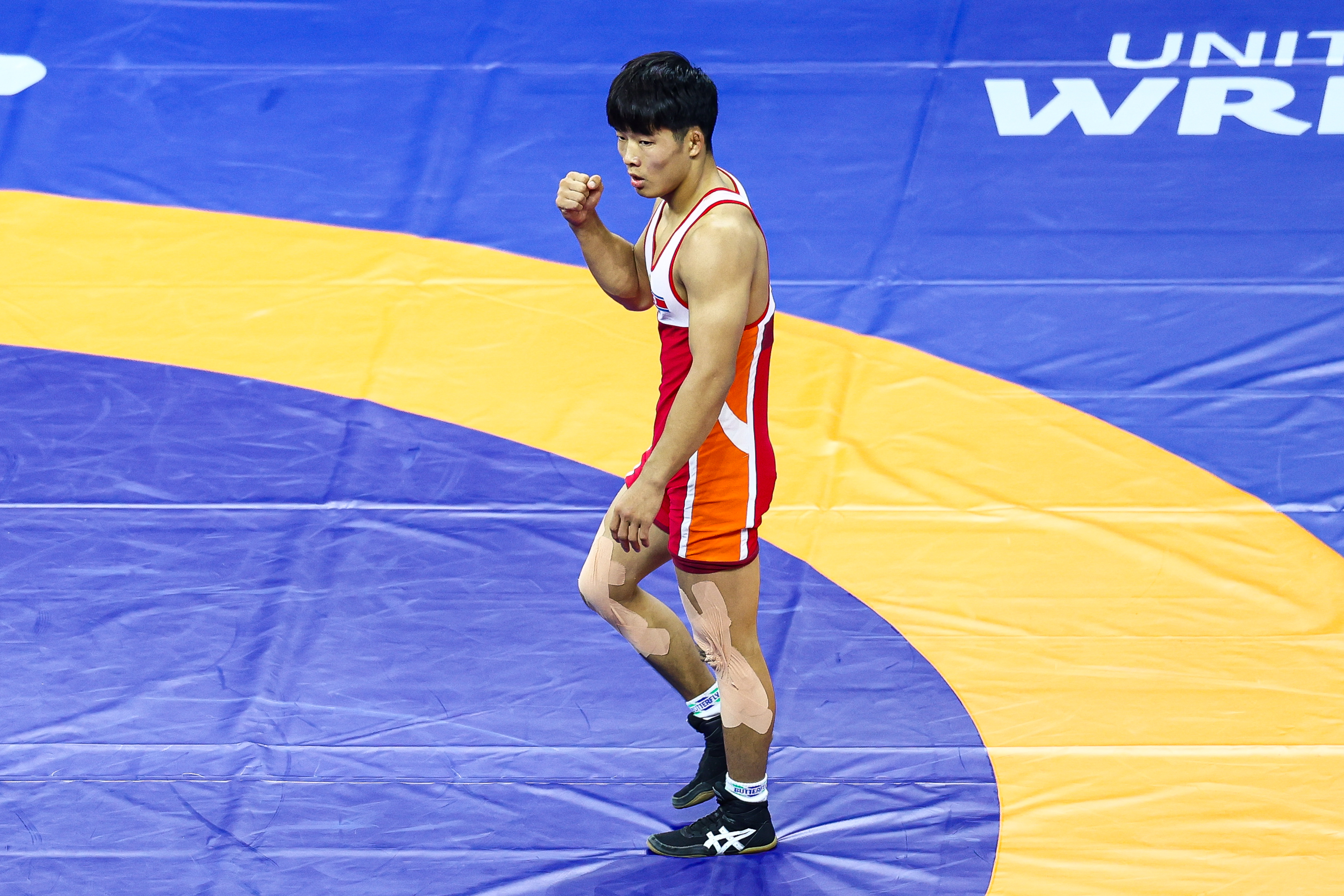
Ri earns 1st Greco medal since 2015 for DPR Korea
In the bronze-medal matches, Paris Olympic bronze medalist Se Ung RI (PRK) gave the DPR Korea its first world Greco medal since 2015 and fourth overall with a victory by fall at 60kg over Amiran SHAVADZE (GEO).
Ri scored a takedown and 2-point throw for a 4-0 lead, then got in deep on a bear hug. When Shavadze tried to counter by lifting up and back, Ri just pressed forward and drove Shavadze to his back for a 4-pointer that would have ended the match anyway by technical superiority. The end came at 2:11 and the scenario was confirmed on challenge.
The other 60kg bronze went to Hrachya POGHOSYAN (ARM), a two-time world U23 bronze medalist who outlasted Georgij TIBILOV (SRB), winning 1-1 by earning the first of the two passivity points awarded in the match.
Both 72kg bronze-medal matches came to early and similar conclusions, with two-time Asian medalist Abdullo ALIEV (UZB) and reigning Asian champion Danial SOHRABI (IRI) both cruising to 8-0 victories for their first senior world medals.
Aliev defeated Yeonghun NOH (KOR), with the decisive points coming from an odd twist in a challenge following a 4-point throw by Aliev.
After scoring an early stepout, Aliev launched his 4-point throw from par terre. The Korean side issued a challenge, which it won -- except that the change was a 2-point leg foul against Noh, which made it an 8-point difference and ended the match at 1:40.
Sohrabi went the more traditional route in defeating Merey MAULITKANOV (KAZ). The Iranian scored only a stepout on a throw attempt while in par terre, but rebounded to put on a six-point spree, finishing with a gut wrench to win in 2:51.
The 97kg bronze-medal matches proved to be wild affairs, with one having the rare occurrence of a fall being nullified on challenge, while the other had a fall confirmed.
Murad AHMADIYEV (AZE) came out on top in a 5-5 decision over Alex SZOKE (HUN) in which the Azeri thought he had reversed to a fall, but was instead flagged for a foul that kept the bout going.
Ahmadiyev started the match with a 4-point arm throw, then stepped over to keep Szoke on his back and nearly secure a fall. The Hungarian side challenged, it was denied and Ahmadiyev led 5-0 going into the second period.
Szoke put the pressure on and gained an activity point, then executed a roll from par terre. But as he tried another, Ahmadiyev suddenly turned to face him and knocked him backward to the mat.
The referee called a fall, but on challenge, a leg foul was detected and Szoke was awarded a 2-point penalty that tied the score, but left him trailing on criteria. Due to the caution, Szoke got another chance at par terre, but couldn't turn Ahmadiyev.
Kiryl MASKEVICH (UWW) saw his fall of Giorgi MELIA (GEO) in the other 97kg bronze-medal match held up after, like Ahmadiyev, he used a stepover to get Melia onto his back.
Melia was on top in passivity, but when he attempted a roll, Maskevich stepped over to put him into a danger position. Melia temporarily spun out, but Maskevich reeled him back in and secured the fall in 1:54. The action was all upheld on challenge.
Day 8 Results
Greco-Roman
60kg (25 entries)
GOLD: Aidos SULTANGALI (KAZ) df. Alisher GANIEV (UZB) by TF, 9-0, 1:07
BRONZE: Se Ung RI (PRK) df. Amiran SHAVADZE (GEO) by Fall, 2:11 (9-0)
BRONZE: Hrachya POGHOSYAN (ARM) df. Georgij TIBILOV (SRB), 1-1
63kg (26 entries)
SEMIFINAL: Hanjae CHUNG (KOR) df. Mohammad KESHTKAR (IRI), 5-3
SEMIFINAL: Aytjan KHALMAKHANOV (UZB) df. Vitalie ERIOMENCO (MDA) by TF, 8-0, :36
67kg (34 entries)
SEMIFINAL: Saeid ESMAEILI (IRI) df. Daniial AGAEV (UWW) by TF, 10-0, 1:44
SEMIFINAL: Hasrat JAFAROV (AZE) df. Razzak BEISHEKEEV (KGZ), 3-1
72kg (30 entries)
GOLD: Ulvu GANIZADE (AZE) df. Ibrahim GHANEM (FRA), 4-2
BRONZE: Abdullo ALIEV (UZB) df. Yeonghun NOH (KOR) by TF, 8-0, 1:40
BRONZE: Danial SOHRABI (IRI) df. Merey MAULITKANOV (KAZ) by TF, 8-0, 2:50
87kg (30 entries)
SEMIFINAL: Alireza MOHAMADI (IRI) df. David LOSONCZI (HUN), 6-3
SEMIFINAL: Aleksandr KOMAROV (SRB) df. Milad ALIRZAEV (UWW), 1-1
97kg (29 entries)
GOLD: Mohammadhadi SARAVI (IRI) df. Artur SARGSIAN (UWW), 3-1
BRONZE: Kiryl MASKEVICH (UWW) df. Giorgi MELIA (GEO) by Fall, 1:54 (5-1)
BRONZE: Murad AHMADIYEV (AZE) df. Alex SZOKE (HUN), 5-5

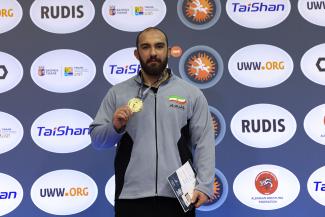
Share your thoughts.
Comments